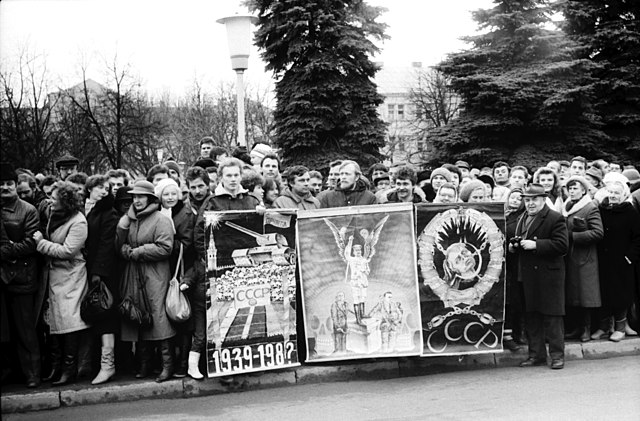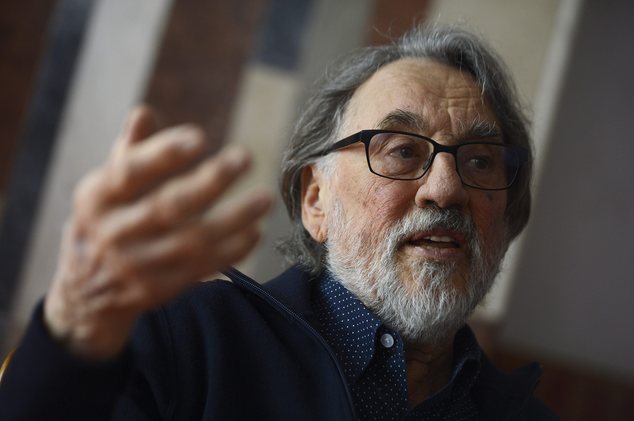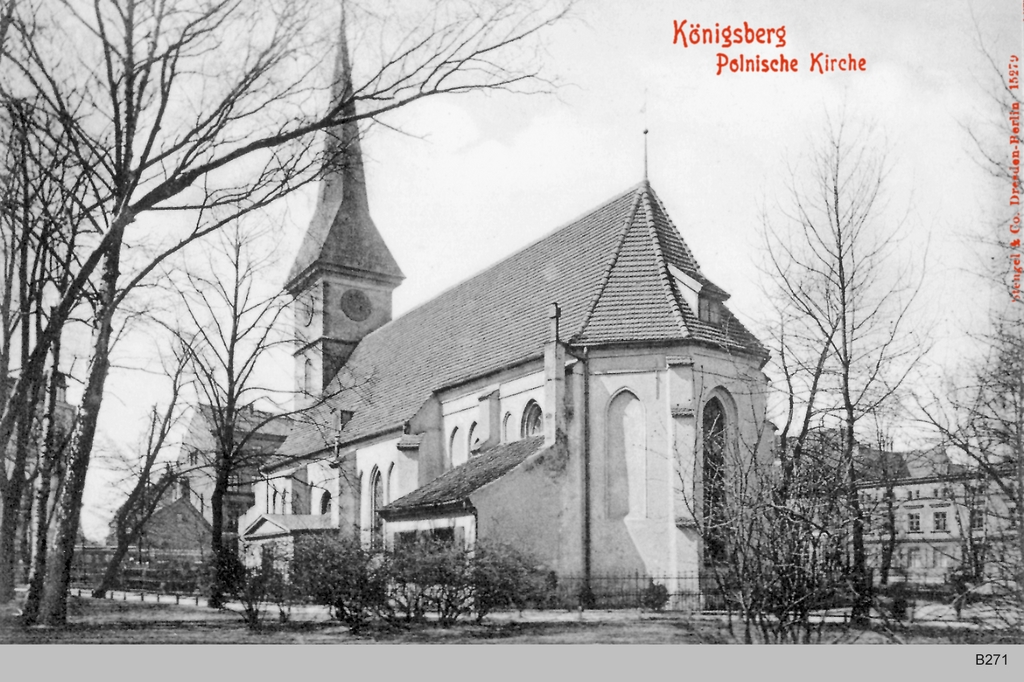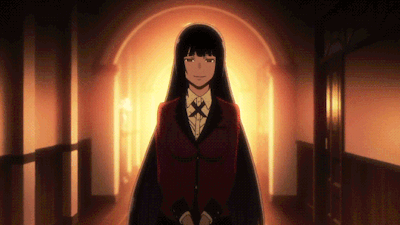You thought this was dead? You thought wrong! 
Enroute to Langenbeck-Virchow-Haus, Luisenstraße, East Berlin
German Democratic Republic
14th November, 1956
“...earlier this afternoon, Hungarian police has announced the arrest of an additional four thousand subversives for taking part in the unrest of October 23rd. New Hungarian chairman János Kádár, has already stated his intention to see justice delivered. However, the new leader has also expressed a desire to unite and support ordinary Hungarians, and forgive those misled by reactionary agitators during the riots. In his own words, reconciliation, not revenge, should be the order of the day...”
The winter chill was fast approaching in Berlin, and the scars of the Great Patriotic War was as prominent as ever. Bombed out ruins of the old fascist regime still stood throughout the shattered capital, the facade of the decrepit Reichstag standing just a few meters within the Western zone. As a lone sedan rode past the open grounds of Marx-Engels-Platz [1], one can see the socialist reality being brought to life. But despite the rise of gleaming apartments to advertise the bright future offered by communism, few were blind to the growing disparity between the two Berlins, and the two Germanies as a whole.
“You didn't have to take the job, Captain,” an old commander spoke as he sat on the back of the sedan, his familiar black uniform easily mistaken for the sinister SS before them. His officer cap on his lap, he appeared embittered and war-weary, his wrinkles ageing his far beyond his real rage as it intermingled with his scars. Combing his greying hair, he spoke to the stranger beside him, “I only wanted my son to do something useful, rather than spend his time clubbing prisoners like a Neanderthal. Fucking boy doesn't know subtlety if he were sitting on it for a dump. Sometimes, I think his mother had spoiled him too much. I wish he were as sensible as you.”
“I wouldn't consider myself sensible, major general,” the woman curtly expressed, “I'm no older than him. I would not dare to pretend that I have your experience, Sir. I just felt someone had to do it, if not him.”
Captain Arnhild Weiss, just twenty-four years of age, appeared the part of the talented heir. Her father, Dr. Ulrich Weiss, had been a valued appartchik, a German communist who fled suppression by the Nazi authorities and helped rebuild East Germany along socialist lines. Arnhild herself had stellar credentials, a former youth leader in the Ernst Thälmann Pioneer Organisation before joining the Stasi itself. The fact that she was of equal rank and similar age to the major general's son – someone who had considerable help climbing the ladder – spoke a lot about her abilities. Had he had a choice, the elder would not have preferred a better daughter over him.
“Don't sell yourself short,” he told her, “I'm sure your father is very proud of you, adopted or not. Your birth parents, too, hopefully, if you ever find them. The war had broken up many families. Must be hard for you.”
“I try not to think about it,” Arnhild quickly answered, almost on reflex as her tone dropped at the idea, “Dr Weiss is my father now, and always. Nothing will change that fact.”
But behind the curt reply was a woman far less assured of her place as a Weiss. While she could not remember a time before her adoptive family, Arnhild could not help but dread a return of her birth family. She dread not find out why. She had no reason to listen to excuses. And with her position and status, she knew there were many who eyed her seat. Glancing at the senior general, she could almost hear the cackles of his son right now, at any mention of Arnhild's dubious origins.


Part 5OOC Notes:
____________________________
Enroute to Langenbeck-Virchow-Haus, Luisenstraße, East Berlin
German Democratic Republic
14th November, 1956
“...earlier this afternoon, Hungarian police has announced the arrest of an additional four thousand subversives for taking part in the unrest of October 23rd. New Hungarian chairman János Kádár, has already stated his intention to see justice delivered. However, the new leader has also expressed a desire to unite and support ordinary Hungarians, and forgive those misled by reactionary agitators during the riots. In his own words, reconciliation, not revenge, should be the order of the day...”
The winter chill was fast approaching in Berlin, and the scars of the Great Patriotic War was as prominent as ever. Bombed out ruins of the old fascist regime still stood throughout the shattered capital, the facade of the decrepit Reichstag standing just a few meters within the Western zone. As a lone sedan rode past the open grounds of Marx-Engels-Platz [1], one can see the socialist reality being brought to life. But despite the rise of gleaming apartments to advertise the bright future offered by communism, few were blind to the growing disparity between the two Berlins, and the two Germanies as a whole.
“You didn't have to take the job, Captain,” an old commander spoke as he sat on the back of the sedan, his familiar black uniform easily mistaken for the sinister SS before them. His officer cap on his lap, he appeared embittered and war-weary, his wrinkles ageing his far beyond his real rage as it intermingled with his scars. Combing his greying hair, he spoke to the stranger beside him, “I only wanted my son to do something useful, rather than spend his time clubbing prisoners like a Neanderthal. Fucking boy doesn't know subtlety if he were sitting on it for a dump. Sometimes, I think his mother had spoiled him too much. I wish he were as sensible as you.”
“I wouldn't consider myself sensible, major general,” the woman curtly expressed, “I'm no older than him. I would not dare to pretend that I have your experience, Sir. I just felt someone had to do it, if not him.”
Captain Arnhild Weiss, just twenty-four years of age, appeared the part of the talented heir. Her father, Dr. Ulrich Weiss, had been a valued appartchik, a German communist who fled suppression by the Nazi authorities and helped rebuild East Germany along socialist lines. Arnhild herself had stellar credentials, a former youth leader in the Ernst Thälmann Pioneer Organisation before joining the Stasi itself. The fact that she was of equal rank and similar age to the major general's son – someone who had considerable help climbing the ladder – spoke a lot about her abilities. Had he had a choice, the elder would not have preferred a better daughter over him.
“Don't sell yourself short,” he told her, “I'm sure your father is very proud of you, adopted or not. Your birth parents, too, hopefully, if you ever find them. The war had broken up many families. Must be hard for you.”
“I try not to think about it,” Arnhild quickly answered, almost on reflex as her tone dropped at the idea, “Dr Weiss is my father now, and always. Nothing will change that fact.”
But behind the curt reply was a woman far less assured of her place as a Weiss. While she could not remember a time before her adoptive family, Arnhild could not help but dread a return of her birth family. She dread not find out why. She had no reason to listen to excuses. And with her position and status, she knew there were many who eyed her seat. Glancing at the senior general, she could almost hear the cackles of his son right now, at any mention of Arnhild's dubious origins.

Langenbeck-Virchow-Haus [1], the current headquarters of the East German parliament. The home of many scientific and medical associations in the past, the building was gutted by Soviet looters during the war of its painting and furniture at the end of the war. Now re-purposed as the site of nascent communist government, the Haus der Volkshammer, it was a natural, if only meeting place for the mysterious Soviet delegation arriving with their latest, perhaps most ambitious project yet. Their request for aid from the Warsaw Pact appeared questionable, if not sinister.
Stepping into a conference room with the major general. It was not hard for the officer to spot the Russians among the officials gathered. In the middle of the table, a tall, sleek-haired blonde man in a Soviet officer uniform was standing beside the rotund, balding leader of the GDR himself, Wilhelm Pieck, as the Russian carefully detailed each document in his hand. Other ministers and politburo members, too, were busy examining the plans, as Arnhild scanned the room briefly for personalities. Off the bat, she counted Walter Ulbricht, with his signature Lenin-style beard, and the unassuming, bureaucratic Erich Honecker [2]. But one face in the crowd almost made her cringe. Among the elderly and middle aged men in stiff suits and uniforms was the eerie brown coif of a significantly younger woman, still in her late twenties. And she knew Arnhild too well, given her position in the Young Pioneers.
“Sirs,” she spoke, as she and the major general saluted the delegates looking up at them.
“Weiss,” Margot Honecker squealed gingerly like a grandmother seeing her ward after a long absence, stepping forward to usher in the young girl in front of the folks [3], “what a surprise! I wasn't expecting you. But it's a nice surprise regardless. Nice, very nice.”
“Major General Scherer,” Ulbricht addressed the senior, “I thought you said you wished to appoint your son on the Soviet project. What happened?”
“Ah, yes...” the hapless general tried to respond, “my son is... preoccupied with more important duties at the moment. I am afraid I am not able to bring him on board. Captain Weiss, however, has generously volunteered for the task. A bit menial for someone of her caliber, but she feels she is up to the task.”
“Yes, we've all heard of Captain Weiss' caliber,” Honecker stated, “my wife wouldn't shut up about her. Wanted to recommend her for the job. Guess she got her wish. In any case,” remarked the protege, introducing the Soviet officer, “this is Colonel Vladimir Petrovich Tonchev, KGB political officer and Soviet air force adviser. His protege has filed a project to the Soviet politburo on a major resettlement project on E-... Kaliningrad Military Oblast. He has requested for support from the members of the Warsaw Pact, including funding and infrastructure. That, surprisingly, includes us.”
“Request,” Arnhild blurted, raising an eyebrow at the Russian, “pardon me for asking, but shouldn't this be the task of their foreign ministry?”
Before Honecker could speak, the Soviet officer quietly raised a hand to stop him, declaring in a calm baritone and crisp German, “the foreign ministry has empowered me to make arrangements with the respective governments independently, with their support, of course. I felt it is necessary to get my message through personally, in hopes for the success of our resettlement project. If all goes well, the new Kaliningrad will be the envy of the world. A world without hate, bigotry or malice. Is that not the dream of the world?”
Glaring at the composed Russian, Arnhild tried hard not to grimace at the words. It reeked of bland Soviet rhetoric, and in all honesty, she had spent her life listening to that, when West Berlin was proving their words to be utter nonsense. Something bode ill about his plans, and the team of cabinet ministers present indicated a great deal of interest. It was not hard for Arnhild to tell the DDR leadership wanted to hear him out. The question was, why?
“Pardon if I am being too blunt, sir,” Arnhild queried, seemingly in disbelief, “but our country is bleeding men to the West as it is. We are not in the position to devote more migrants eastwards. If our brightest minds leave, who will be left?”
It was a daring question, not the least in the presence of the cabinet. Hushed whispers befell the room as the minsters nervously spoke among themselves. A dangerous move that could easily upend a promising officer's career, Arnhild could tell the ministers were discomforted. As the Soviet officer peered back, the cabinet could only dither at a response. Even the major general was starting to panic.
“Please, gentlemen,” Margot spoke out to the cabinet, her Stepford smile wavering a bit as she tried to calm them, “she is young; idealistic. She's merely as worried about the emigrations as we are. Aren't you, Miss Weiss.”
“Of course,” Arnhild stated, electing not to speak further as she observed the apprehension of her seniors, “I mean no disrespect, I-”
“I understand your concerns, Captain. I understand...” grunted the unnerved president, wiping the sweat off his balding head, “rest assured, your superiors have that thought out, is that not, Mr Honecker?”
“Umm... Yes, Comrade President,” Honecker sharply announced, “rest assured, Captain Weiss. Our country will not forfeit more of our future to the capitalists. We need only to divert the migrations east, as the good colonel kindly suggested to us. Kaliningrad will be the pearl of the socialist future. It is then only the matter of convincing the doubtful of that future, after which they are free to return here to emulate it, rather than, as you clearly dread, escape west. Is that fine with you, Colonel?”
“Absolutely, sir," Vladimir graciously replied, "it's not our policy to restrict their right of return to their homelands. How you intend to meet our population quotas is up to you, minister. We are only here to manage the city. We need only your support.”
Eyeing the two as she bowed her head, it was not hard for Arnhild to guess what they meant. Her crude query, at the risk of offence, was merely to confirm what she suspected at first. The 'resettlement' project, just several years after the Soviets explicitly expelled a German community that had lived in Kaliningrad since the time of the Teutonic Knights, was not something that was expected to be advertised to the East German regime. For them to ask the Eastern Bloc for migrants was even more so, when the vast Soviet population was more than enough to fill the city. But for every question answered, several more quickly reared their ugly heads. What were they planning for Kaliningrad, if not just a simple reeducation camp? Something just seemed amiss.
Arnhild may yet face more surprises...
Cold War Exhibition, National Museum
Kyonigsberg, Prussia
23 January, 2016
“...The program, as Vladimir advertised, was a stark contrast to the harmonious society Yevgeny was aiming for,” Professor Vorarlberg explained to the class, “envisioning a model Soviet city, Kaliningrad was intended, above all else, as a territory-wide 'reeducation facility'. Pouring the best resources the Soviet bloc could muster, Tonchev sought to advertise the 'ideal' Soviet model to dissatisfied elements of the Eastern Bloc, while concentrating surveillance by the KGB and Eastern Bloc agencies in the territory. It was, in all respects, a correctional facility in all but name, with travel to and from Kaliningrad restricted under closed city rules. It was this contrasting views that was to become the source of strife between Yevgeny and his mentor in the formation of the SSR, and one that would carry on far into the fall of the Soviet Union and beyond.”
“But the story of the West Baltic is not just of repression and leaders, but the lives of those who has been irreversibly changed by the experiences in the country,” he elaborated, picking up the boxes of coloured table tennis balls as he handed them to their teachers, “your grandparents, your parents... their lives are all intricately weaved into the story of this land, and are still shaping the identity of modern-day Prussia. That is what you're here to find out about, and what you learn in the story of the West Baltic's rise will prove useful in learning about its end. For without the framework built by the committee, Prussia would just be another province of a much larger country in Eastern Europe, such is the reality of nations.”
“Anyway,” he remarked, “it's currently about 10.30 am. You are free to look around the exhibition until 11.30 am, after which we will assemble at the main lobby and your teachers will debrief and dismiss you. Try to get as much info as you can here, and then, if you want, you can look at the other exhibits around. Remember, you got a group assignment to work on, so I suggest focusing on the ethnic group you're working on. And if you have time, look at the last exhibition in the next room for your second and final one. I won't give out details yet, but it will give you an idea of what to expect when we go through Prussia's independence. I'll see you all in an hour then.”
Sitting back down on a bench as he dismissed the class, Roman could feel the energy draining from his body. He felt tired for some reason, having mustered every bit of his nerves not to feel intimidated, but for some reason, he managed, even as time seemingly slowed to a crawl to prolong his agony. It was not easy dealing with the privileged. While he could trust public schools to have a more sensible education, private institutions appeared to have become too heavily politicised for his liking. He could not fault them, though. However he disagreed with their views, they were still entitled to them. It was not as if he was not complicit in a government effort to impress their version of events on the masses, such was the nature of politics.
“I'd rather wear a hard hat right now,” he remarked to himself, thinking over his other assignment at Königsberg Castle [3]. The restorations and excavations now seemed far less daunting than school children with the 'commissars' now breathing down his neck. He could only hope he would not see them again, and pity the person assigned to lecture them.
Stepping into a conference room with the major general. It was not hard for the officer to spot the Russians among the officials gathered. In the middle of the table, a tall, sleek-haired blonde man in a Soviet officer uniform was standing beside the rotund, balding leader of the GDR himself, Wilhelm Pieck, as the Russian carefully detailed each document in his hand. Other ministers and politburo members, too, were busy examining the plans, as Arnhild scanned the room briefly for personalities. Off the bat, she counted Walter Ulbricht, with his signature Lenin-style beard, and the unassuming, bureaucratic Erich Honecker [2]. But one face in the crowd almost made her cringe. Among the elderly and middle aged men in stiff suits and uniforms was the eerie brown coif of a significantly younger woman, still in her late twenties. And she knew Arnhild too well, given her position in the Young Pioneers.
“Sirs,” she spoke, as she and the major general saluted the delegates looking up at them.
“Weiss,” Margot Honecker squealed gingerly like a grandmother seeing her ward after a long absence, stepping forward to usher in the young girl in front of the folks [3], “what a surprise! I wasn't expecting you. But it's a nice surprise regardless. Nice, very nice.”
“Major General Scherer,” Ulbricht addressed the senior, “I thought you said you wished to appoint your son on the Soviet project. What happened?”
“Ah, yes...” the hapless general tried to respond, “my son is... preoccupied with more important duties at the moment. I am afraid I am not able to bring him on board. Captain Weiss, however, has generously volunteered for the task. A bit menial for someone of her caliber, but she feels she is up to the task.”
“Yes, we've all heard of Captain Weiss' caliber,” Honecker stated, “my wife wouldn't shut up about her. Wanted to recommend her for the job. Guess she got her wish. In any case,” remarked the protege, introducing the Soviet officer, “this is Colonel Vladimir Petrovich Tonchev, KGB political officer and Soviet air force adviser. His protege has filed a project to the Soviet politburo on a major resettlement project on E-... Kaliningrad Military Oblast. He has requested for support from the members of the Warsaw Pact, including funding and infrastructure. That, surprisingly, includes us.”
“Request,” Arnhild blurted, raising an eyebrow at the Russian, “pardon me for asking, but shouldn't this be the task of their foreign ministry?”
Before Honecker could speak, the Soviet officer quietly raised a hand to stop him, declaring in a calm baritone and crisp German, “the foreign ministry has empowered me to make arrangements with the respective governments independently, with their support, of course. I felt it is necessary to get my message through personally, in hopes for the success of our resettlement project. If all goes well, the new Kaliningrad will be the envy of the world. A world without hate, bigotry or malice. Is that not the dream of the world?”
Glaring at the composed Russian, Arnhild tried hard not to grimace at the words. It reeked of bland Soviet rhetoric, and in all honesty, she had spent her life listening to that, when West Berlin was proving their words to be utter nonsense. Something bode ill about his plans, and the team of cabinet ministers present indicated a great deal of interest. It was not hard for Arnhild to tell the DDR leadership wanted to hear him out. The question was, why?
“Pardon if I am being too blunt, sir,” Arnhild queried, seemingly in disbelief, “but our country is bleeding men to the West as it is. We are not in the position to devote more migrants eastwards. If our brightest minds leave, who will be left?”
It was a daring question, not the least in the presence of the cabinet. Hushed whispers befell the room as the minsters nervously spoke among themselves. A dangerous move that could easily upend a promising officer's career, Arnhild could tell the ministers were discomforted. As the Soviet officer peered back, the cabinet could only dither at a response. Even the major general was starting to panic.
“Please, gentlemen,” Margot spoke out to the cabinet, her Stepford smile wavering a bit as she tried to calm them, “she is young; idealistic. She's merely as worried about the emigrations as we are. Aren't you, Miss Weiss.”
“Of course,” Arnhild stated, electing not to speak further as she observed the apprehension of her seniors, “I mean no disrespect, I-”
“I understand your concerns, Captain. I understand...” grunted the unnerved president, wiping the sweat off his balding head, “rest assured, your superiors have that thought out, is that not, Mr Honecker?”
“Umm... Yes, Comrade President,” Honecker sharply announced, “rest assured, Captain Weiss. Our country will not forfeit more of our future to the capitalists. We need only to divert the migrations east, as the good colonel kindly suggested to us. Kaliningrad will be the pearl of the socialist future. It is then only the matter of convincing the doubtful of that future, after which they are free to return here to emulate it, rather than, as you clearly dread, escape west. Is that fine with you, Colonel?”
“Absolutely, sir," Vladimir graciously replied, "it's not our policy to restrict their right of return to their homelands. How you intend to meet our population quotas is up to you, minister. We are only here to manage the city. We need only your support.”
Eyeing the two as she bowed her head, it was not hard for Arnhild to guess what they meant. Her crude query, at the risk of offence, was merely to confirm what she suspected at first. The 'resettlement' project, just several years after the Soviets explicitly expelled a German community that had lived in Kaliningrad since the time of the Teutonic Knights, was not something that was expected to be advertised to the East German regime. For them to ask the Eastern Bloc for migrants was even more so, when the vast Soviet population was more than enough to fill the city. But for every question answered, several more quickly reared their ugly heads. What were they planning for Kaliningrad, if not just a simple reeducation camp? Something just seemed amiss.
Arnhild may yet face more surprises...
Cold War Exhibition, National Museum
Kyonigsberg, Prussia
23 January, 2016
“...The program, as Vladimir advertised, was a stark contrast to the harmonious society Yevgeny was aiming for,” Professor Vorarlberg explained to the class, “envisioning a model Soviet city, Kaliningrad was intended, above all else, as a territory-wide 'reeducation facility'. Pouring the best resources the Soviet bloc could muster, Tonchev sought to advertise the 'ideal' Soviet model to dissatisfied elements of the Eastern Bloc, while concentrating surveillance by the KGB and Eastern Bloc agencies in the territory. It was, in all respects, a correctional facility in all but name, with travel to and from Kaliningrad restricted under closed city rules. It was this contrasting views that was to become the source of strife between Yevgeny and his mentor in the formation of the SSR, and one that would carry on far into the fall of the Soviet Union and beyond.”
“But the story of the West Baltic is not just of repression and leaders, but the lives of those who has been irreversibly changed by the experiences in the country,” he elaborated, picking up the boxes of coloured table tennis balls as he handed them to their teachers, “your grandparents, your parents... their lives are all intricately weaved into the story of this land, and are still shaping the identity of modern-day Prussia. That is what you're here to find out about, and what you learn in the story of the West Baltic's rise will prove useful in learning about its end. For without the framework built by the committee, Prussia would just be another province of a much larger country in Eastern Europe, such is the reality of nations.”
“Anyway,” he remarked, “it's currently about 10.30 am. You are free to look around the exhibition until 11.30 am, after which we will assemble at the main lobby and your teachers will debrief and dismiss you. Try to get as much info as you can here, and then, if you want, you can look at the other exhibits around. Remember, you got a group assignment to work on, so I suggest focusing on the ethnic group you're working on. And if you have time, look at the last exhibition in the next room for your second and final one. I won't give out details yet, but it will give you an idea of what to expect when we go through Prussia's independence. I'll see you all in an hour then.”
Sitting back down on a bench as he dismissed the class, Roman could feel the energy draining from his body. He felt tired for some reason, having mustered every bit of his nerves not to feel intimidated, but for some reason, he managed, even as time seemingly slowed to a crawl to prolong his agony. It was not easy dealing with the privileged. While he could trust public schools to have a more sensible education, private institutions appeared to have become too heavily politicised for his liking. He could not fault them, though. However he disagreed with their views, they were still entitled to them. It was not as if he was not complicit in a government effort to impress their version of events on the masses, such was the nature of politics.
“I'd rather wear a hard hat right now,” he remarked to himself, thinking over his other assignment at Königsberg Castle [3]. The restorations and excavations now seemed far less daunting than school children with the 'commissars' now breathing down his neck. He could only hope he would not see them again, and pity the person assigned to lecture them.

Part 5
- The Palace of the Republic, the seat of the Volkshammer from 1976 to 1990, wasn't built yet, though the Berlin City Palace had already been demolished in 1950. At the time, the space was known as Marx-Engel-Plafz. Only a portal from a balcony, where Karl Liebknecht declared the German Socialist Republic, was preserved.
- Stretching it a bit, I suppose, since he wasn't due to return until 1958. I suppose Vlad may have called him in to put in a good word for his mentor. Let's put it at that.
- I needed a Stepford smiler. Enough said.
- Auf Wiedersehen, sowjetischen Roboter
- Historical
- Wilhelm Pieck - State president of the German Democratic Republic
- Walter Ulbricht - General Secretary of the SED Central Committee
- Erich Honecker - Ulbricht's protege
- Margot Honecker (nee Feist) - Head of the Ernst Thälmann Pioneer Organisation
- Fictional
- Colonel Vladimir Petrovich Tonchev - KGB Officer, former air force pilot, Yevgeny's mentor and Valeriy's elder brother
- Captain Arnhild Weiss - Stasi Officer, Waifu
Last edited:
































































